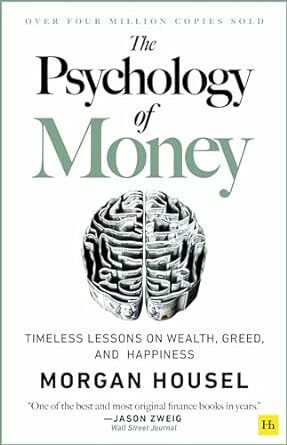According to the cover of The Psychology of Money by Morgan Housel, the book promises to teach readers “timeless lessons on wealth, greed, and happiness.” And that is exactly what the book delivers.
Author Morgan Housel does an excellent job of discussing the psychology behind why people behave the way they do when it comes to money. He covers everything from investment bubbles to the way our brains are wired to seek out short-term gratification.
While the book is technically about money, it is really about so much more. Housel expertly weaves together stories and research to paint a picture of how our emotions, upbringing, and biology all play a role in the decisions we make about money.
This is not a get-rich-quick book or a how-to guide. Instead, it is a thought-provoking look at the often-complex relationship we have with money. If you are interested in learning more about why you make the money decisions you do, then this book is definitely for you.
Summary
The Psychology of Money by Morgan Housel is a book that explores the complex and often irrational relationship that people have with money. The book is not a typical personal finance guide that tells you how to save, invest, or budget. Instead, it is a collection of 19 short stories that illustrate how different people think about and behave with money, and how these decisions affect their happiness, success, and well-being.
The book covers topics such as the role of luck and risk in financial outcomes, the importance of having a long-term perspective, the dangers of overconfidence and greed, the benefits of humility and flexibility, and the power of compounding and patience. The book also challenges some common assumptions and myths about money, such as the idea that more money equals more happiness, that wealth is a measure of intelligence or skill, or that financial success is predictable and linear.
The main message of the book is that there is no one right way to handle money, because everyone has different goals, values, experiences, and emotions. The book encourages readers to be more aware of their own biases and preferences, and to develop a personal philosophy of money that suits their unique situation. The book also emphasizes that money is not an end in itself, but a tool to achieve other things in life, such as freedom, security, peace of mind, and fulfillment.
Ask the right questions and learn how your brain influences your wallet
Extra New Money, Debt, and Saving Chapters
Looks at how self-interest can be universal
Uncommon sensible financial insights
Silver-level Amazon Fulfillment Enduring Reseller Program
Relatively little coverage of behavioral science
Several new chapters on ethics and finances
If you’re the kind of person who finds a materialistic fixation motivating, this Psychology of Money book is not for you. The author is a notoriously cold, bleak realist – and yet, the book is a thoughtful, humor-driven exploration of the themes of wealth, greed, and happiness that have been studied by psychologists for decades. You might not be a happier person after reading this book, but you’ll be smarter as well.
Language: English
File size: 2259 KB
Screen Reader: Supported
Enhanced typesetting: Enabled
Print length: 224 pages
X-Ray: Enabled
Word Wise: Enabled
FAQ
What is the central theme of the book “Psychology of Money”?
The book “Psychology of Money” by Morgan Housel explores the idea that doing well with money has a little to do with how smart you are and a lot to do with how you behave. In other words, it explores the psychology related to money and how it impacts people’s decisions about saving, spending and investing.
Who is the intended audience for “Psychology of Money”?
The intended audience for this book is pretty much anyone interested in improving their relationship with money. It is suitable for both finance professionals looking to understand the psychological aspects of financial decision-making and laypeople interested in personal finance and investing.
Does the book have any practical advice about managing money?
Yes, the book is filled with practical advice and insights based on behavioral economics and personal finance. Housel covers topics on saving, spending, and investing, emphasizing the importance of understanding your own behavior towards money and aligning your financial plans with your personal values.
How is this book different from other finance books?
Unlike many finance books that focus on specific strategies for investing or detailed financial advice, “Psychology of Money” discusses the emotional and psychological elements influencing money habits. It helps readers understand why they make certain financial decisions rather than telling them what decisions to make.
What kind of approach does Housel use in “Psychology of Money”?
Housel uses a narrative approach, weaving together captivating stories, historical events, and personal anecdotes to illustrate complex financial concepts. This makes the book engaging, relatable, and easy to understand.
Why does Housel emphasize behavior over intelligence in money matters?
Housel emphasizes that behavioral qualities like patience, humility, and perspective often matter more than raw intelligence in making sound financial decisions. He suggests that understanding and controlling one’s psychological biases and emotional responses can lead to better financial outcomes.
What are some of the most important lessons that can be learned from the “Psychology of Money”?
Some key lessons from the book include recognizing your behavioral biases, understanding that the desire for wealth and status can lead to poor financial decisions, and learning that risk and luck play a significant part in financial success or failure.
How does “Psychology of Money” view risk and luck in financial planning?
Housel asserts that risk and luck play a larger role in our lives than we might realize or like to admit. He emphasizes the importance of risk tolerance, humility, and the recognition that luck can influence financial success or setbacks.
What type of investment philosophy does Housel recommend in “Psychology of Money”?
While Housel doesn’t prescribe any specific investment strategy, he does highlight the value of long-term, consistent investing, and warns against speculative or risky financial moves. He advises readers to plan for uncertainty and strive for financial resilience rather than aiming for spectacular success.
Is “Psychology of Money” easy for a novice to understand?
Yes, “Psychology of Money” is written in a clear and engaging style. Housel avoids heavy financial jargon, instead using illustrative stories and examples to explain complex concepts, making the book accessible to novices and experienced investors alike.
Personal Development Unlimited is your go-to place to be You, Without Limits. We bring together personal development and self-improvement articles, books, courses and videos in one place. Find your self-growth opportunities easily.
Comments
0 comments



